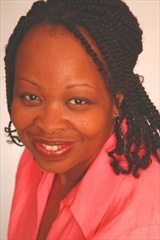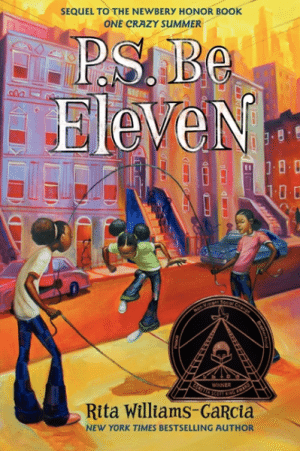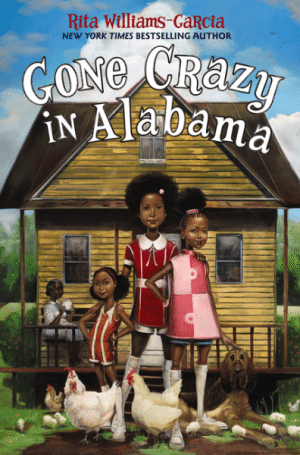Interview by Vicki Palmquist

When you wrote One Crazy Summer, did you already know you had a longer story to tell? And if you didn’t know then, when did you know?
I was so focused on telling the one story of children’s involvement in the Black Panther Movement. As I dug into my characters’ backstories and projected their actions into the future, I knew I had another book to write. This happened in the middle of One Crazy Summer when I was explaining Cecile’s choices and history to myself. I could see those early days so clearly. How she came to live with Pa and Uncle Darnell. There’s something about knowing the past that allows you to project into the future. Before I knew it, the seeds were beginning to spring up for P.S. Be Eleven. Then as I began to work out the plot for PSBE, I played my actions and consequences game. What are the short term consequences of these actions? What are the long term consequences? This helps me to really construct realism in the plot, especially in a story where all things can’t be resolved. Some things have to continue on in a natural way in the readers’ minds. Well, those darn consequences became food for Gone Crazy in Alabama. I didn’t plan three novels, but the characters had more story life in front of them. I believe this is the end. I didn’t get that sense of rays shooting out into another story.
How did you decide which episodes to place in each of your three books about the sisters?
I didn’t have all three stories. One Crazy Summer was its own story. When I realized there would be a Book 2, I thought more about the overarching theme, which would be change which seemed to explode during the late 60s, early 70s. Change in the family, change in the political structure, the unspoken but underlying change in the black community as a result of returning traumatized Vietnam veterans and drug use, the change the women’s movement brought to homes, country and community, and most important, those deeply personal changes of our narrator. The trick was to compress all of those changes, even cheat time a little to give young readers a sense of what it was like to be in the midst of those changes and seeing how they weren’t just abstraction, but changes that had direct impact. The third book allowed me to talk about what we in the black community talk about amongst ourselves—holding onto family amid the breakdown and evolution of family. The plotting and focus of each story is different. It is the incremental growth of the sisters—and even the family members—that is the continuum that stretches across all three stories. So, you can read any of the stories in whichever order you chose, but you see and feel the change and growth of the characters when the stories are read from summer to summer.
Are you a busy, noisy-places writer or a quiet-spaces writer?
I do a little of both. I need absolute quiet at home. No radio, TV, internet, phones. When I’m out and about, I can work with the buzz and sirens of the city around me. My ears hear it as one noise. Cell phone noise, particularly loud cell phone noise is harder. I carry ear plugs in my bag.
You’ve made this family so real, from when we first meet Delphine, Vonetta, and Fern in One Crazy Summer to the parting scene in Gone Crazy in Alabama. I found myself wanting to become a friend, staying in their lives forever. What is the most important aspect of this family’s story for you, the writer?
I like the way that everyone feels they are right. This is good for me as a writer. It promises conflict. But isn’t this at the source of most families and familial conflict? I hope in that way, I’ve asked the reader to understand what they might not agree with. Oh, what a cool trick, if we can do this in general!
Does writing a first draft come quickly for you or do you weigh each word carefully as you’re writing it?
 I have a long incubation period. I spend a lot of my waking hours day dreaming the story. Telling myself the story. As I research and daydream I begin to feel more confident about the story. I start writing a month or so later. When I’m writing the first draft the words are unimportant. Occasionally, the connection between myself and the narrator is so strong that I’m a good 60%-75% close to final as I slog through the first draft. But I really use my first draft to confirm proof of story. To nail down direction. But honestly, there are so many false starts. But the language of the story, the voice and tone of the story begins to take shape. I’m less anxious when I feel the story has its own voice and not just the few words I know. As I get closer to the final drafts I work hard on language. When the story is in good shape, I concentrate on the language.
I have a long incubation period. I spend a lot of my waking hours day dreaming the story. Telling myself the story. As I research and daydream I begin to feel more confident about the story. I start writing a month or so later. When I’m writing the first draft the words are unimportant. Occasionally, the connection between myself and the narrator is so strong that I’m a good 60%-75% close to final as I slog through the first draft. But I really use my first draft to confirm proof of story. To nail down direction. But honestly, there are so many false starts. But the language of the story, the voice and tone of the story begins to take shape. I’m less anxious when I feel the story has its own voice and not just the few words I know. As I get closer to the final drafts I work hard on language. When the story is in good shape, I concentrate on the language.
At what point do you revise your manuscript?
I revise after I have my clear direction. After I have the first draft. I write in my notebook by hand, and make notes along the way (“Nah”, “deal with this later”, “not working”, etc.). Sometimes I stop the forward movement to nail down a few early chapters because they anchor the story. But I try to push forward to confirm that the story works, or what I call “proof of story.” I revise chapters several times and drafts several times. I should say, I don’t begin typing the story until it is a story. I don’t know if I recommend that practice. It’s just the way I do it.
I want to so badly to ask you if these three books are biographical and yet my rational brain knows they are fiction. As a reader, I want this family to be real. I want to hear Miss Trotter’s laugh and Ma Charles’ laugh and I wanted to be in that room with the whole family after the storm. Can you tell us what percentage of these stories comes from your own background?
Who will read this interview? Hopefully, not my young readers—no offense!! I don’t think my young readers want to hear this clinical thing about my characters. Anyway, I construct them all and tend to stay clear of basing them on actual people. The characters have to magnetically fit into the family and story. If I have a responsible character, like Delphine, I give her a reason to activate her super powers. Enter Vonetta and Fern—in their distinct ways. If Big Ma is fearful, traditional, a good Christian (at least in her mind), her daughter-in-laws must be in opposition to that in their distinct ways. Big Ma’s mother must be a source of consternation. Her son, who is in between tradition and change, must be her ally at times and her opposition at other times when it comes to his daughters and his mates. See how it works? I might take an aspect of my mother and drop it into Cecile—but as strong and off kilter as both can be, they are two distinctly different mothers and persons. My mother was into her Jimi Hendrix and Janis Joplin, but she was the woman of the household and there was no mistaking that. She did absolutely everything, while my sibs and I were responsible for homework, playing and making our beds.
If you know me at all, you know that I love making things. Making characters is the best Play-Doh™ ever!
Delphine and I were born the same year, so I was aware of the world spinning and changing during the late sixties, early seventies. I kept a diary that noted several events like assassinations of Dr. Martin Luther King, Senator Robert F. Kennedy — as well as the manhunts of their assailants. Apollo 11, etc., etc. I didn’t write these grand or precocious insights. I saw things as a child, so I kept that in mind as I wrote Delphine’s narrative.
My own family isn’t like the Gaithers in the specific sense, but my parents migrated from the south to Queens, New York in the 30s and 40s. My early life up until twelve was as an army brat. My father served in Vietnam — no drug involvement, but that’s not to say he wasn’t affected by the war. There were three of us kids, all thirteen months apart. My sister Rosalind is the oldest, brother Russell is the middle, and I’m the youngest. Am I Fern? Nah. My early life up until twelve was an army brat living on army bases and army towns.
I lived through this same era but not in the same neighborhoods (Oakland, New York City, Alabama). After reading these books, I feel that my understanding of my own history got larger. Do you feel that way as the writer?
 Absolutely. There is so much untold history. One of the parts of history that Gone Crazy tells, is of the crossings between people, be they through brutality, necessity or choice. We are made up of so many people and histories. It seems ridiculous to continue to tell a singular story. The best history, to me, is family history. We are all witnesses to our times, and most of us maintain connections with our elders. We should take note of what we see, feel and think during our time, but also take in the stories of our elders while they’re with us.
Absolutely. There is so much untold history. One of the parts of history that Gone Crazy tells, is of the crossings between people, be they through brutality, necessity or choice. We are made up of so many people and histories. It seems ridiculous to continue to tell a singular story. The best history, to me, is family history. We are all witnesses to our times, and most of us maintain connections with our elders. We should take note of what we see, feel and think during our time, but also take in the stories of our elders while they’re with us.
How does Gone Crazy in Alabama relate to the past?
Even though Gone Crazy is set in the summer of 1969, its reach extends back to the 1830s, up until the 1870s, through the turn of the century, and so on. My grandmother was raised by her great-grandmother, who was a slave and whose father fought and died in the Civil War. My grandmother was our family’s link to this period. I thought about these human links and that they disappear. So, I began to think about the Charles-Gaither-Trotter family tree. I estimated approximately when the ancestral characters would be born and what was happening during those times. I immersed myself in Alabama history to better weave the crossings between African Americans, Native Americans and European Americans. (If not for every other of my African American classmates bragging about their “Indian” roots, I would have missed the Native American branch in this Alabama history!) My sister even jumped on the “we’re part Cherokee” bandwagon, although I knew better. Alabama was the perfect setting! It had the railroad system running from the Oklahoma Indian Territories through Augtauga County during Reconstruction, plus a textile mill dating back to the 1800s. (The textile mill was where Louis Gaither Sr., as well as Uncle Darnell worked—although I scrapped that fact from the novel.) The KKK was active in Alabama from post-Civil War, petering out in the late 1800s and then resurging in the 1920s, and active through the 1960s in George Wallace’s Alabama. So even though the three sisters were not raised in the Jim Crow South, and most of the “Whites Only” signs have been removed, they are breathing the air of the past that still has its presence during their time.
I thought about the two sisters whose lives hadn’t changed much from the time their father was alive. They retain a lot of that past. Ma Charles wouldn’t have indoor plumbing if not for her neighbor. The idea of subsisting and sharing with neighbors is how both sisters lived, perhaps following the ways of their mothers. Ma Charles talks about how “other folks” (you know she means white people) jumped out of windows during the 20s because of the market crash, while poor people with gardens survived it. Her purist free-range eating and organic gardening is now all the rage. Both she and Miss Trotter keep true to the lives they lived as children born in the late 1800s, down using “sad irons” that are placed on a hearth or on a stove, instead of electric irons. The bonus is, for Delphine, who is serving her penance while ironing the sheets she refused to iron earlier, Delphine is also touching hands with history. Holding hands with women who knew slavery and emancipation. She doesn’t know that, but I do! My hope is that the reader does also.
I’m about change, but I love that neither Ma Charles nor her half-sister, Miss Trotter don’t want to change who they are. These are women who were educated in a one-room school, with kids from five to fifteen, and as young women they probably remember when Oklahoma became a state. They have to feel those times when Native Americans needed work passes to work outside of their designated territories and reservations. The 82 year-old sisters have to feel those times when African Americans testifying in court would have provided entertainment for white people. And I have to understand what would have been humiliating for them, their mothers and their father. I have to feel those times and what they mean to the characters with links to the past. Mind you, it all can’t go inside the story, but time, place, and people must be a part of me while I write.

Great interview, Rita!! It’s so good to hear your wise, warm, wonderful voice, if only in this somewhat removed way!
I agree! Wonderful to hear your voice and to learn about the background to this third novel. We loved reading the second one in our book group; can’t wait to read the third. Be well!
I so enjoyed ONE CRAZY SUMMER. I’m eager to read the final book of this fascinating trilogy!